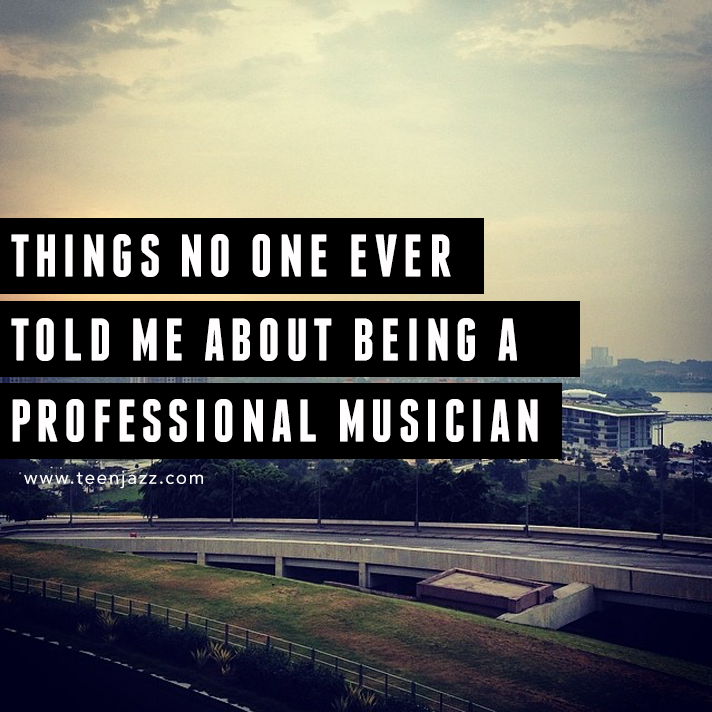I began my career as a professional musician while in high school and I’ve learned more outside of school these past few years than I did in all of my time in school (and I went to school through a Master’s degree).
Some of the lessons that I’ve learned were much harder than others, but I’m grateful for all of the knowledge I’ve gained throughout my career.
Despite the fact that no one told me the following about being a professional musician, I’d like to share some of what I’ve learned with you.
- Finding the motivation to work as a self-employed, independent musician isn’t always easy. There are some days that you just don’t feel like doing anything, but you need to push through it and sit down to do the work anyway.
- How little your the role your actual playing plays on a day to day basis. It isn’t hours of practice and nothing but performances all day, every day. There is so much other work that goes into being a professional. Business stuff. Image stuff. Networking stuff. Promotion stuff. Finance stuff. Contract stuff.
- How much time (or money) it actually takes to put out quality content. Creating an excellently produced album isn’t as simple as jumping into a basement recording studio with your high school buddies. While it can be done, it isn’t the best way to do it. And album costs aren’t just the production costs (what it takes to create the album), there are also promotion and distribution costs.
- It’s hard. And sometimes you want to quit. Sometimes you wish you had decided to do something else. But then are other times where you laugh at yourself for ever even playing around with the idea of doing something else.
- It’s okay to have hobbies. Not all of your free time needs to be spent working on and improving your music. A lot of it should, but not all of it. It’s healthy to get away and do something else every so often.
- Depression is a thing. For most artists – whether it be artist, writer or musician – depression is a thing and if you struggle with it, do something about it. You might want to try the best CBD oil, or beste CBD olie as they say in the Netherlands where it’s common for artists to use this stuff to treat their depression. CBD oil can be found in many different products too, there is not one single way to take it. You can find these online. For example you can research private label Softgels and see if they might be an option for you. Otherwise you have access to gummies, ointments, skincare products, the list goes on. Over here though you may need to look up if you can use it or look into alternatives. You have to be careful as some places in the US still do not accept cannabis products even if they are being used for medical purposes. In some states like Virginia marijuana dispensaries are an ordinary place to find these kinds of depression treatments but in others you may find it is not currently an option available to you. Instead, you might want to trey regular exercise and healthy eating. And, if it gets so extreme that it affects your work to the point where you can’t face it, you might want to have a look at long term disability insurance rates to protect your income. But whatever you do, remember that you aren’t alone. And if you need to, you should talk to someone about it.
- People can be downright cruel. But they can also be incredibly and surprisingly supportive.
- Creativity blocks are real. Oh, so real. It isn’t all free-flowing compositions, inspired improvisation, rainbows and unicorns. Sometimes your playing downright sucks. Sometimes you have a bad day. Sometimes you just don’t feel like writing or practicing. Just try to work through it so that it doesn’t become too many days in a row.
- Stick-to-it-ness is one of the best talents you can have.
- You aren’t just composing and performing for yourself. A lot of people will tell you this, and in a way, they aren’t wrong. You need to create music that you want to hear first, but that doesn’t mean you should ignore you audience. What I think that really means when you break it down is that if you’re selling out and trying to ride trends, your audience will see you as inauthentic. You need to create the music you want to create and that you enjoy. Something you can put your heart and soul behind. That’s what others enjoy and want to hear. That’s what matters most. But, don’t write and record music for the sake of numbers, do it because you’re trying to reach out and connect with your audience (however many people that may be).
- You’ll very likely do a lot of gigs that you really wish you didn’t have to do.
- But you’ll also do gigs that are amazing and meet amazing people along the way.
- That you cannot afford to stop learning. There is always room for growth.
So there you have it, thirteen things I’ve learned about being a professional musician. What are your experiences? I’d love to hear about them in the comments below!
[template id=”182″]
